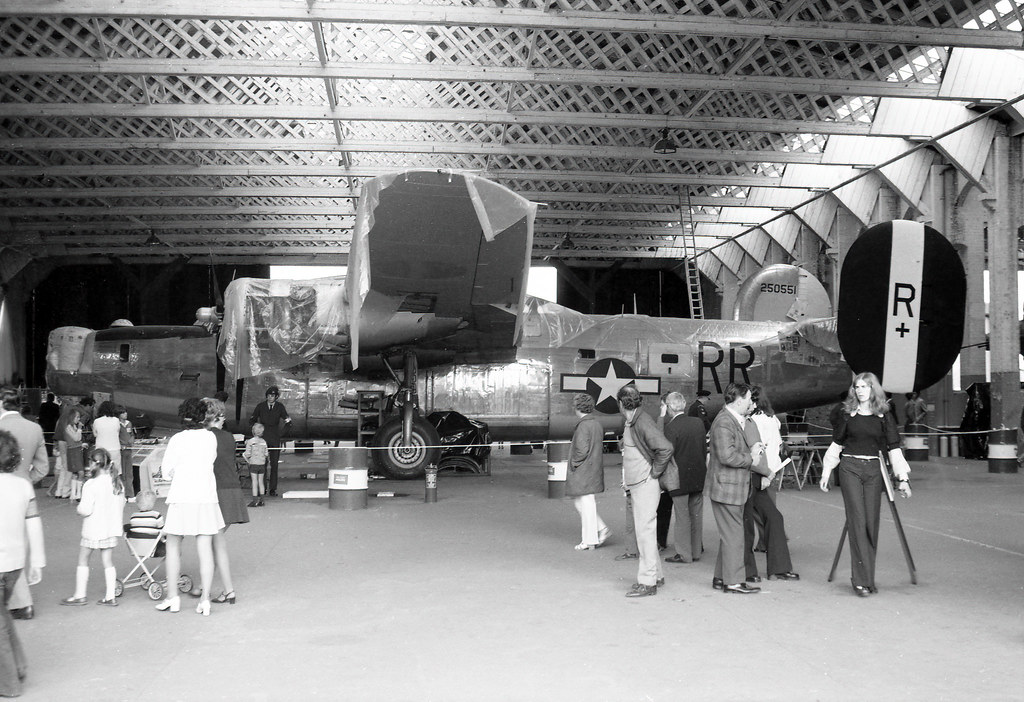#China-India-Burma theater
Text

Lancaster armored cars disguised as elephants in India during WWII.
111 notes
·
View notes
Text
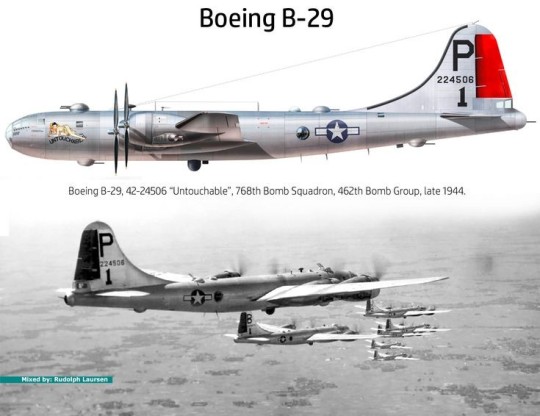
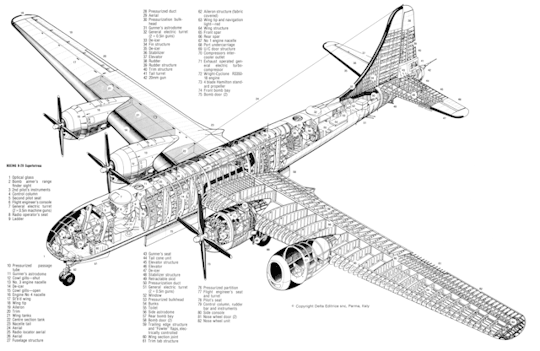
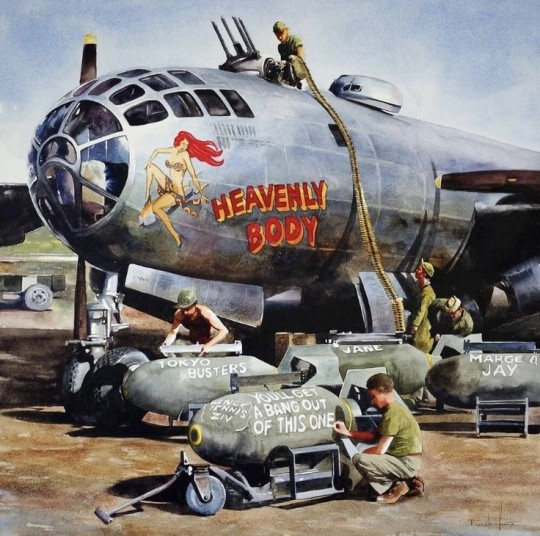

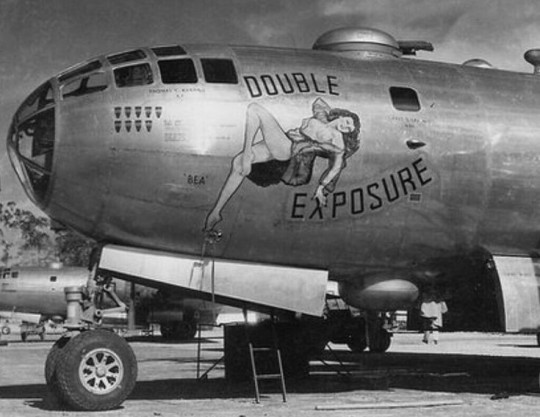
Boeing B-29 Superfortress - US Army Air Force
#b29 superfortress#superfortress#us army air force#us army air corps#usaaf#usaac#ww2 planes#ww2 photo#ww2 aviation#ww2 aircraft#ww2 history#pacific theater#china burma india#20th air force
304 notes
·
View notes
Text
Tiger Man
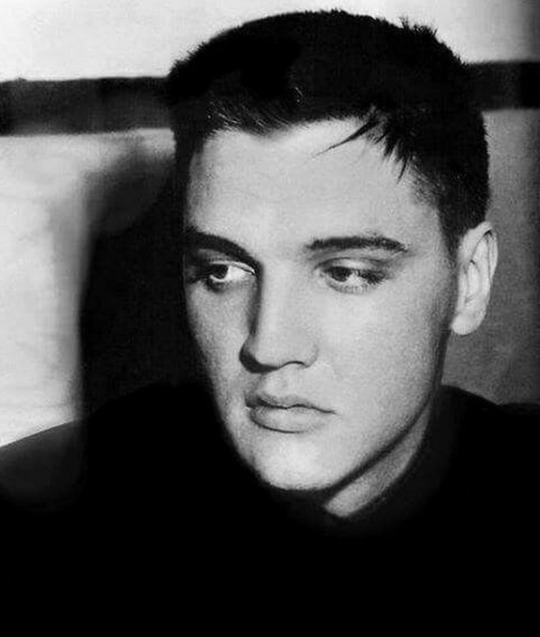
Summary: The year was 1941, bandmates and secret lovers Scotty Moore and Elvis Presley got caught red handed by Scotty’s fiancée, and this led to the young men being thrusted headlong into the China-Burma-India theater of World War II as members of the first American Volunteer Group (The Flying Tigers).
Chapter 10. Garden of Roses
Pairing: Scotty Moore/Elvis Presley (m/m), Ken Ishikawa/Elvis Presley (m/m)
Word Count: 3.6k
Warnings: mentions of past murders, rape, dreams and nightmares, sex and intimacy, physical and sexual assault
“So, why did you save me? And why would you kill your own kind?” Elvis finally brought up the perplexing questions in his mind, still blindfolded, but now sitting in the back of a car with Ken Ishikawa sitting next to him and Seto driving.
“Oh, don’t insult me, El. I would never consider Lieutenant Miura or his minions to be my kind!” The Major seemed to take offense to the notion. “They were too reckless and vulgar, no sense of proper appreciation or awe for a magnificent creature like you, darling. It’s like when I go hunting and encounter an endangered and beautiful species of deer, the first thing on my mind can’t be to shoot it for meat.”
The tone and wording of the Japanese officer were creepily intimate, setting off alarms in Elvis’ mind. “What in the world do you want with me then? I’m of no use to you as a source of intelligence, you know that by now!” The pilot was keenly aware that his hands were still tied up tightly behind his back, feeling numb and stiff. His feet remained in shackles as well, reminding him of his prisoner status. He had a bad feeling about the direction this conversation was taking.
“I guess that’s a fair question.” Ishikawa sighed, “Can’t you tell I’ve been infatuated with you this whole time??” With that confession he placed his right hand on the American’s left thigh, causing the latter to jump a little. Elvis tried but was unable to escape this intrusive advance due to the small confines of the backseats. “Don’t be so prudish, El.” The officer chuckled, still using the nickname without ever getting consent from the young man. He squeezed and rubbed the prisoner’s thigh suggestively against his will, delighting in it at the other’s expense.
Now that the cat was out of the bag, Ishikawa went on to reveal more about his thoughts and motivation: “When I saw you for the first time, on the verge of bleeding out when you arrived, I already felt an irrational attraction to you. I just knew I couldn’t let them amputate your leg; it would be such a shame to leave you permanently crippled. Later I got to know about your personality during our interactions and the interrogation sessions. You are stubborn and spunky, almost too much for your own sake. But you earned my respect for your tenaciousness, and for being loyal to your country. In the Imperial Army we were taught to look down on captive soldiers because they were seen as dishonorable cowards. But you impressed me with your mental toughness and stoicism. Although I was frustrated that you weren’t spilling any useful information we were seeking, I realized I couldn’t let you die when you almost didn’t make it during the last interrogation. I couldn’t believe how emotionally attached I had become in such a short time. I halted the interrogations to let you recover and began to scheme of a way to remove you from the torture and pain. When I received transfer orders for you, I wasn’t filled in regarding if you were being transferred to a prison camp literally or if that was a cover for secret execution. But given my background and experience, I had a strong inkling it might be the latter. So Seto and I followed the car, planning to abduct you on the way even if this was just going to be a regular transport to Kandaw prison camp. Of course, as you know now, we ended up catching them in the act and took out the whole execution squad instead…”
“So you went through all that to make me into your lover doll??” Elvis interrupted the Major, sounding indignant and outraged. He was almost going to use the more jarring term “sex slave” instead, but even just the thought left him chilled to the bone.
“I wouldn’t put it in that way, El. I understand you have a lot of misgivings against me, but I have genuine feelings for you.” Ishikawa objected. His prisoner replied in an incredulous tone: “That’s just ludicrous! We are enemies and you are a sadist, end of story!!”
“Calm down, will you?” Major Ishikawa ripped off Elvis’ blindfold all of a sudden, engaging him in eye contact. “The truth is, there was another personal reason I was drawn to you initially. You reminded me of my first love in high school. His name was Sean. He was strawberry blond and not as pretty as you, but he had a pair of pure blue eyes as well. We kissed and made out, that was the extent of what we did. But eventually he left me after his older brothers found out about us. They beat me almost to a pulp and told me to go back where I came from. Soon after that Sean sent me a letter saying our relationship was over because he was pressured by his family to end it. I knew even if I were a girl, I would never be accepted by his folks simply because I was Japanese, even though my family was much wealthier than his. That was when I realized I didn’t belong in America, even though up to that point I had spent more years in the U.S. than in Japan. Another valuable lesson I learned was only the strong survive, if I didn’t want to be hurt anymore, I had to become the aggressor. A year or two after that I went back to my home country and joined the Imperial Army with support and encouragement from my own family. One of my uncles had connections with the Cabinet, it followed that the political ambitions of the Ishikawa clan would benefit from a successful military career if I managed to achieve that. So, I went through hellish training and had to prove myself repeatedly during the war, eventually rose through the ranks to become the Major Ishikawa you are seeing today.”
“Why did you tell me all this?” The pilot inquired uneasily. “Because I want you to know where I came from, El. I used to be softhearted like you, I used to be a romantic, but reality put me back in my place. Now I know, nothing lasts forever in this world, it’s survival of the fittest. Power, dominance, and pleasure are what I’m after, and there is nothing wrong with that.” The Kempei officer concluded emphatically, his right hand creeping up from the bound prisoner’s thigh to the soft skin below his navel underneath his flimsy white shirt, creating a wave of nervous spasms there.
The tense air in the car was disrupted when Seto pulled the vehicle into the driveway of a residence. As he parked, Elvis looked out the car window at the nice British-style house shrouded in moonlight. He regretted not paying more attention to how they got there and the layout of the surrounding neighborhood, but he could hardly be blamed given his antagonist’s disturbing invasion of his personal space. This was a good-sized detached house quite far removed from the next home due to a large fenced-up backyard. After getting out from the car, the party of three entered the garden directly from a side door, bypassing the main house. They walked across a lawn and passed between some overgrown rose bushes, coming to a small two-story brick structure in the rear section of the courtyard. Elvis guessed this little dwelling was probably originally designed for a housekeeper or the occasional guests. One sinister feature of this otherwise harmless looking guesthouse was that all the windows had been boarded up.
As the three got in the door, they passed the laundry room which took up the ground floor, climbed the narrow stairs into the second story. Ishikawa lighted two kerosene lamps, while explaining he and his wife had been staying in the main house which used to belong to a British official before it was abandoned prior to Japanese occupation.
“Mrs. Ishikawa??” Elvis repeated the title unwittingly, surprised by the existence of such a figure. “Didn’t think I’d be married?” The Major sounded sarcastic, “Mizuki is her name. She knows by now I’m more attracted to men. I entered matrimony just to stave off constant urging by my parents and relatives. Don’t worry about her, she knows not to disturb us here. She’s a nice girl and a diligent housewife. Her family owed us a large sum of money, so they needed this union to keep going.”
Despite the oil lamps, the whole place was dark and damp, feeling like a dungeon. The floor plan included a small open kitchen area, a dining room, a bathroom and a bedroom with a large bed taking up most of the space. When Elvis’ hands were finally untied, they were so numb and weak he wondered if they were permanently damaged. He was led to the round table in the tiny dining room and told to sit in a chair. The host then offered him a glass of water, pointing out that his lips looked chapped from dehydration. When the young man almost dropped the glass as he tried to raise it to his uniquely curvy lips, the Major stood up, took the glass from his hands and tried to feed the water to him. In the blink of an eye, Elvis leaped out of his seat and head-butted Ishikawa hard in the stomach. The Japanese officer was caught off guard and stumbled for a moment, but quickly recovered and chased after the daring prisoner. The pilot made a run for the door after the surprise attack, but he fell across the floor almost right away as his shackled feet couldn’t keep up with his body. He crawled forward in desperation, but it was all over when Seto almost crushed him with his full weight just before the American could reach the door.
“Well, that really took the cake for stupidity. Even for you, El!” Ishikawa loudly reprimanded his non-cooperative subject as the latter was pulled up from the ground by Seto. The Major sounded a little out of breath, clenching his teeth from lingering pain as he clutched his midsection. “What did ya expect? You think I’d let ya have your way with me without a fight??” As usual, the fearlessness in the young man’s voice and demeanor was impressive.
“I figured you might need taming, but you’ve just made it a lot harder for yourself!” The irate Kempei officer signaled the physical therapist with his eyes. Subsequently, the latter helped Ishikawa strong-arm Elvis to the bedroom and strapped him to the bed securely. The sight of the gorgeous prisoner finally tied down to his bed and spread out for him awakened a flood of instincts and desires within the intelligence officer. He could barely contain his lust as he quickly dismissed Seto so that he could be left alone with the object of his wet dreams.
“Here we are, in our own little world at last!” The excitement in the Major’s voice was palpable. The blue-eyed airman felt like a mouthwatering piece of dessert he could swallow up whole. “Just how many allied soldiers have you violated like this, you scumbag?” the incapacitated pilot suddenly questioned while Ishikawa proceeded to cut open his clothes with a pair of scissors. “Watch your mouth or you’ll regret it in a minute!!” The Major warned in response to the profanity, then paused for a bit, apparently debating if he should provide an actual answer. In the end he conceded: “Alright I guess I owe the truth to you. I had taken two prisoners and held them here in the past. But it was different because both of them did agree to have sex with me. Each of them had also divulged military secrets to us during interrogation. I think they would do anything as long as their lives were spared…” “So, what did you do to them?” Elvis interrupted the Japanese officer rather loudly, eyes glaring at his face.
Giving a nonchalant shrug, Ishikawa replied: “So I used them to satisfy my physical needs, and then I disposed of them when I got tired of them. I buried them under the rose bushes in this backyard.” “What?!” Elvis yelled, extremities straining against the ropes instinctively. “You are a psychopath and serial killer if I ever saw one!” The Kempei officer yelled back without missing a beat: “They deserved it! Those two betrayed their own country, there should be no mercy for traitors!” “That does not change the fact you are a cold-blooded rapist and murderer!” Memphis Flash wouldn’t back down, pointing out the undeniable.
“Looks like you’ve forgotten that you are still in my hands! What you need is a little help with quieting and calming down!” Before the last word had been spoken, the domineering military man took out a roll of masking tape from a drawer next to the bed. Disregarding objections from his victim, Ishikawa taped his mouth shut. As the young man’s face began to turn a little red from hyperventilating and making muffled grunting noises behind the tape, the ruthless army man took out a clearly well-prepared pre-mixed syringe with needle and jabbed Elvis in the arm, injecting unknown medicine into a muscle there.
The Flying Tiger continued to buck against his restraints despite the futility of it all, but only a few minutes passed by when he began to get drowsy. The Major was now smiling and saying something, but the words sounded echoey and remote. Elvis watched helplessly as the Japanese officer stripped him of all his clothes, arranging his limbs and torso in demeaning postures. He watched with horror as the same vile man unzipped the pants of his Ninja outfit, freeing himself and proceeded to drill into his core with almost no lubrication or preparation. The pain from the rear was deep and tearing, but dulled by unnatural sedation and an emptiness which was overarching. He could see his body shiver and rock beneath the fiend who was attacking with savage energy. A drop of tear fell from corner of his right eye despite attempts to hold it in. Ambient white noise started to get so loud that it overwhelmed Elvis, his vision became more and more limited. His eyes rolled up and darkness engulfed him at last.
Elvis was standing on the bank of the raging Salween River, with wind blowing through his torn and ripped white shirt. He needed to wash himself clean, that was the only thought on his mind as he stared despairingly at the torrent. A couple of teeny, little hands grabbed a hold of him and tugged on his clothes. When the sad-eyed young man looked down, he found two Chinese school boys and Wen Fang standing next to him. The youngsters pleaded with him not to take the next step, saying he was their hero. “Uncle Xiao Ai! My sister and I are waiting for you in Kunming. Don’t leave us, you are my favorite pal!” The Yang sister added, stretching out her arms in an invitation. The pilot had no choice but to give in then, so he bent down and lifted the little girl up in his arms. “Uncle Xiao Ai, will you sing us a song? We love to hear you sing!” She implored as she wrapped her arms around the tall American’s neck in a warm embrace. “Xiao Fang, you know I’ll do anything to make you happy.” Elvis sighed, gathered his thoughts and chose to sing a slow ballad with gentle melancholy:
I saw the harbor lights
They only told me we were parting
Those same old harbor lights
That once brought you to me.
I watched the harbor lights
How could I help it?
Tears were starting.
Good-bye to golden nights
Beside the silvery seas.
As the serenade came to a close, Elvis realized he was no longer at the riverbank, and the kids had disappeared as well. Instead, he was back in his own bedroom in Memphis, surrounded with the familiar pink decorations. The Blue Moon Boys singer was crying in bed, with his head buried in a big Teddy bear. Mama Gladys came in dressing like an angel ghost again: “Oh baby, don’t give up. I know how hard it’s been for you, but believe me, help is on the way.” Her only son raised up his head, looking back at Gladys with large teary eyes: “Satinin, s-sorry to let you down. But I-I can’t take it no more. My heart and soul had been shattered and crushed. Maybe it’s best to end it all.” “Don’t think that way, baby.” Gladys walked next to the bed, running her hand through that naturally splendid head of hair, massaging the young man’s scalp, “You gotta soldier on, and there’s a solution to everything. Don’t forget, ending your own life is a sin.”
“But you told me I’d already sinned for loving a man. Sinning one last time can’t be that much worse.” Elvis pointed out the incongruence in the logic, not ready to change his course. This was immediately met with disproval by his Mama, who slapped him lightly on the back as an admonishment: “Don’t you talk back to Satinin, and never second guess the fairness of God. He works in mysterious ways. Trust me baby, I need you to hang on. There is light at the end of the tunnel…”
The next thing Elvis remembered was fronting the Blue Moon Boys in a dynamite gig in front of an exuberant crowd. After the conclusion of the show, he and Scotty escaped the wild teenage fans and ran into the backstage dressing room. They locked the door and kissed each other sloppily. Scotty’s steely blue eyes lit up as he admired the naked body of his perfect lover, perching on top of the narrow vanity table, with clothes scattered on the ground in a semicircle. The guitarist’s magical fingers aroused and soothed his pliant partner all at once. Confident and in control, Scotty pulled the singer to the edge of the table, placing that pair of graceful legs over his arms, entering the younger man from below in a tight embrace. Elvis almost burst into tears from the rush of warmth and intimacy that enveloped him. His heart screamed in ecstasy, but his mouth was seized and occupied by Scotty’s zealous tongue, so only the odd moan was heard. Finally releasing his mouth when both of them were out of breath, Scotty lifted his boyfriend off of the vanity top and flipped him over to face the mirror.
Elvis bent over the countertop with his chest touching the cool wooden surface, he could feel one firm hand of his lover on his back pushing him down while his lower body was crowded in from behind. Next Elvis’ hands were caught, and they were easily tied up behind his back with a necktie. Experienced hands stroked him up and down sensuously, from his erect nipples to his narrow waist, not to mention the firm and shapely buttocks. Warm lips peppered his lower and then upper back with little pecks, working up to the base of his neck. Suddenly, a sharp pain shot through Elvis as he felt a vicious bite there. He couldn’t help but let out a scream after what felt like a beastly or a vampire attack. Everything happened so fast, and it all went horribly wrong after that.
“What on earth? Scotty, are you alright?” Trying to get over his shock and understand what happened, the young singer asked his partner. This was greeted with silence and a hand that grabbed his neck and choked it with brutal strength. Another hand pulled his head up by the hair until he saw his own reflection in the vanity mirror a few inches away. Pale and perturbed, the young man on the receiving end of this senseless battering finally caught a glimpse of the man who dealt it out. “Scotty can’t answer you. You are mine now, El!” The officer in Kempei uniform sported a malevolent grin on his face. He turned his suffocating and defenseless victim over, licked across his chest and nipples, making his ill intent clear. When Ken Ishikawa finally released his strangle hold on Elvis’ throat, the feisty young American spat right in his face: “Let go of me, you son of a bitch!! What did you do to my Scotty?”
Without a flinch, the Major wiped the saliva from the side of his face with a handkerchief. Unsheathing his katana, the officer showed the fresh blood on its sharp and shiny blade: “Are you sure you want me to answer the question? Let’s just say you’ll never see your lover again.”
“No way! You liar! Scotty is still alive! I know it!” Elvis went berserk at the ludicrous suggestion that his Scotty had been killed. Completely disregarding the danger and deadliness of the Kempei officer wielding a katana sword, he kneed Ishikawa in the gut and tried to run despite his hands being tied up behind him. That was when he felt a cold blade impaling him in the middle of the back. He collapsed to the ground with blood pouring out and his life rapidly draining from him, the last thought on his mind before everything faded to black was: “Scotty is alive, he will be fine, I know it…”
#elvis presley#scotty moore#elvis fan fic#m/m#world war ii au#china-burma-india theater#flying tigers
2 notes
·
View notes
Photo

“NEW THREAT TO BURMA ROAD,” Vancouver Province. May 18, 1942. Page 8.
----
This map, detailing the distances between each point on the much-battered Burma Road, shows a second route which may be taken by the Nipponese to outflank the Chinese armies now successfully defending the highway near Lungling. This route follows the railway from Indo-China to Kunming, and is through difficult mountain country.
Meanwhile Chinese guerrilla bands between Lashio and Lungling are impeding the Japanese advance. Along the Indian border, the British have dug in on new lines after a slow retirement, which afforded precious weeks for completing the defense of northeast India.
#burma road#invasion of burma#china burma india theater#kunming#lashio#british india#british burma#british raj#british empire#imperial japan#world war II#chinese soldiers#chinese army
2 notes
·
View notes
Video
B-24J Snafu by TK622
Via Flickr:
B-24J S/N 42-73246 of the 308th Bomb Group, 373rd Bomb Squad, 14th Air Force. Crashed during take off on 08 May 1945 in Madhaiganj, India, killing all on board. The photo is part of a series of nose art photos taken by an official photographer. The photos were available for airmen to purchase. This example comes from the album of George D. Bonner, Navigator on a B-24 of the 425th Bomb Squad.
#B-24#Bomber#Liberator#WW2#World#War#Two#China#Burma#India#Theater#Nose#Art#Snafu#Sad#Sack#308th#Bomb#Group#airplane#aircraft#plane#flickr
0 notes
Text

1945 02 Final assault - Stan Stokes
B-29 Superfortress 42-24625 from 498th BG, 875th Bomb Squadron Nose Art 'Lady Mary Anna'
The largest and most powerful bomber of WW II, the Boeing B-29 Super Fortress, played a major role in bringing about the defeat of Japan. In addition to accelerating Japans surrender following the bombing of Hiroshima and Nagasaki with atomic bombs, thousands of B-29 crews flew tens of thousands of bombing missions against Japan from bases in China, India, and later in the War from recaptured islands in the Pacific. B-29s entered service in 1943 following a lengthy, problem-filled, development process of three years in response to the governments request for a long range strategic bomber. Only Boeing and Douglas (the B-32 Dominator) responded to the governments requests, and the B-32 had even greater development problems than the B-29. Powered by four giant Wright R-3350-23 radial engines generating a total horsepower of 8,924, the Super Fortresses typically carried crews of ten. They were capable of a top speed of 357-MPH, and at slower cruising speeds had a range of more than 3,200 miles. The B-29 was a large aircraft for its time with a wingspan in excess of 140 feet and a length of just under 100 feet. The Super Forts also had pressurized forward and aft hulls, which made the long distance missions a bit more comfortable for the flight crews. B-29s typically carried defensive armament which included ten machine guns and a single tail-mounted canon. Because of the pressurized hull, the guns were operated by remote control. The first operational B-29 wing was the 58th which flew out of the China-Burma-India theater. On March 9, 1945 General Curtis LeMay ordered an unusual low altitude attack on Tokyo by hundreds of B-29s carrying incendiary bombs. Five such low level missions were scheduled over a ten-day period, and the combined destruction of these missions exceeded that of either of the atomic bomb missions. B-29s were also effectively used to mine Japanese ports and shipping lanes. The Kawasaki Ki-45 Toryu heavy fighter, which is depicted attacking the B-29 in Stan Stokes painting, entered production in 1941 following a lengthy four year development. About 1,700 of these aircraft, code named Nick by the allies, were produced. The Ki-45 never proved effective as a long range daylight interceptor. It was, however, used effectively in ground attack and night fighter roles. It was one of only a few Japanese aircraft that had some success against the onslaught of B-29s because it was able to attain the high altitudes necessary to intercept the high-flying Super Fortresses.
39 notes
·
View notes
Text

Ann Sheridan holds a knife used by the Gurkhas, Indian jungle fighters, she brought back from her 60,000 mile USO camp show tour of the Mediterranean theater of operations, India, China and Burma, in New York, September 1944.
40 notes
·
View notes
Photo
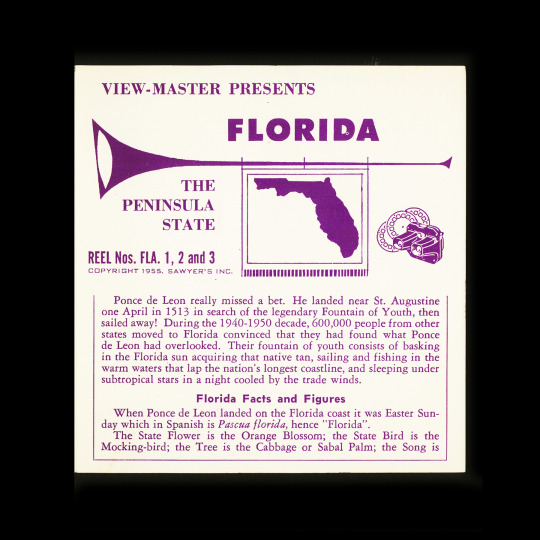
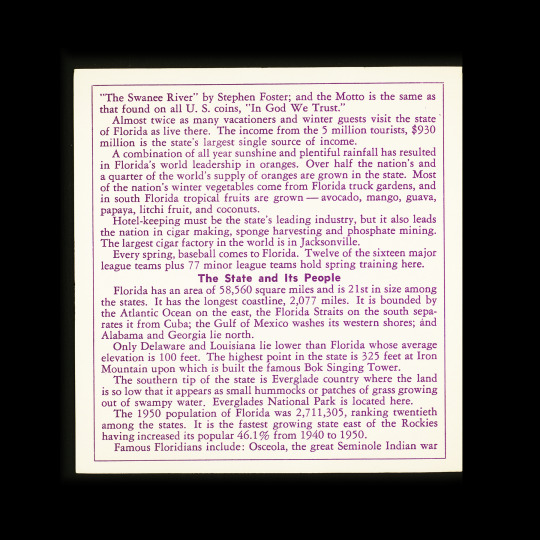

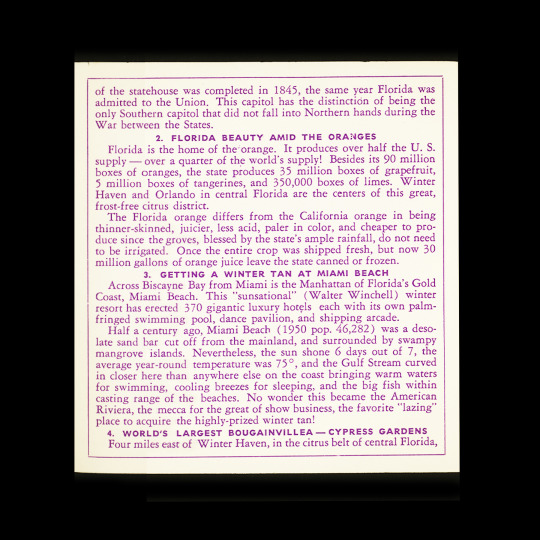

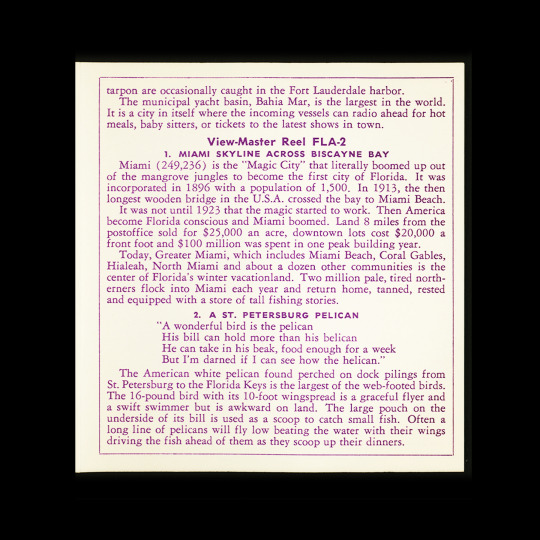

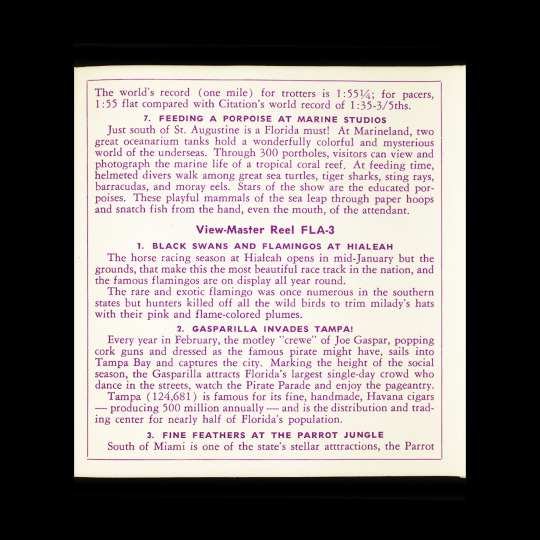

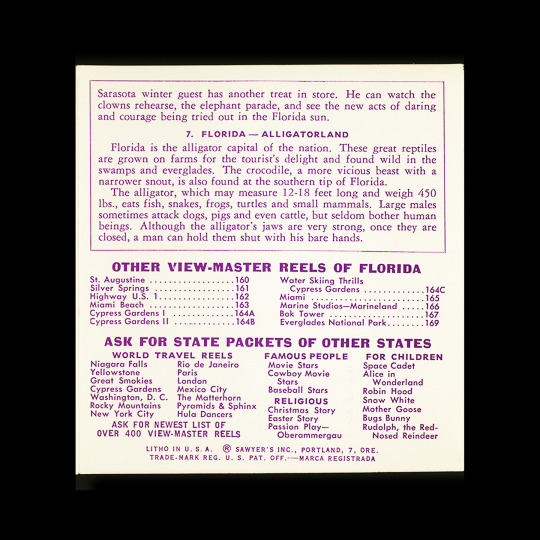
Brand: View-Master
Packet Title: Florida
Booklet Title: View-Master Presents Florida
Booklet Subtitle: The Peninsula State
Date: 1955
Note: When reading the booklet descriptions, please remember that these booklets are old (most are 65+ years old) and the information and history presented in them as factual may be inaccurate, outdated, and in some cases, offensive.
Booklet Introduction Description:
Ponce de Leon really missed a bet. He landed near St. Augustine one April in 1513 in search of the legendary Fountain of Youth, then sailed away! During the 1940-1950 decade, 600,000 people from other states moved to Florida convinced that they had found what Ponce de Leon had overlooked. Their fountain of youth consists of basking in the Florida sun acquiring that native tan, sailing and fishing in the warm waters that lap the nation's longest coastline, and sleeping under subtropical stars in a night cooled by the trade winds.
Florida Facts and Figures
When Ponce de Leon landed on the Florida coast it was Easter Sunday which in Spanish is Pascua florida, hence "Florida".
The State Flower is the Orange Blossom; the State Bird is the Mocking-bird; the Tree is the Cabbage or Sabal Palm; the Song is "The Swanee River" by Stephen Foster; and the Motto is the same as that found on all U. S. coins, "In God We Trust."
Almost twice as many vacationers and winter guests visit the state of Florida as live there. The income from the 5 million tourists, $930 million is the state's largest single source of income.
A combination of all year sunshine and plentiful rainfall has resulted in Florida's world leadership in oranges. Over half the nation's and a quarter of the world's supply of oranges are grown in the state. Most of the nation's winter vegetables come from Florida truck gardens, and in south Florida tropical fruits are grown - avocado, mango, guava, papaya, litchi fruit, and coconuts.
Hotel-keeping must be the state's leading industry, but it also leads the nation in cigar making, sponge harvesting and phosphate mining. The largest cigar factory in the world is in Jacksonville.
Every spring, baseball comes to Florida. Twelve of the sixteen major league teams plus 77 minor league teams hold spring training here.
The State and Its People
Florida has an area of 58,560 square miles and is 21st in size among the states. It has the longest coastline, 2,077 miles. It is bounded by the Atlantic Ocean on the east, the Florida Straits on the south separates it from Cuba; the Gulf of Mexico washes its western shores; and Alabama and Georgia lie north.
Only Delaware and Louisiana lie lower than Florida whose average elevation is 100 feet. The highest point in the state is 325 feet at Iron Mountain upon which is built the famous Bok Singing Tower.
The southern tip of the state is Everglade country where the land is so low that it appears as small hummocks or patches of grass growing out of swampy water. Everglades National Park is located here.
The 1950 population of Florida was 2,711,305, ranking twentieth among the states. It is the fastest growing state east of the Rockies having increased its popular 46.1% from 1940 to 1950.
Famous Floridians include: Osceola, the great Seminole Indian war chief who was never defeated but finally tricked into imprisonment; John Gorrie, of Apalachicola, inventor of mechanical refrigeration; Marjorie Kinnar Rawlings, whose Pulitzer prize novel, The Yearling” dealt with the Florida backwoods; and Joseph W. "Vinegar Joe" Stilwell, commander of the China-Burma-India Theater of War.
Highlights of History
After discovering Florida, Ponce de Leon landed two shiploads of colonists at Charlotte Harbor in 1521, but constant clashes with the Indians resulted in his death and the abandonment of the colony.
Tales of fabulous cities of gold (which were not to spring up until the 20th century) lured other Spanish explorers. Hernando de Soto landed in the Tampa area in 1539 to begin a four year march.
Don Pedro Menendez de Aviles, Captain General of the Spanish treasure fleets, came to Florida in 1565 to found St. Augustine and a line of posts from Tampa Bay to Port Royal, South Carolina.
After the British captured Havana, Cuba, in 1763, Spain agreed to trade Florida for the Cuban capital. But after the American Revolution, the British were squeezed in by the new United States and Spanish strongholds to the south. They ceded Florida to Spain from whom the United States bought it in 1819 for $5 million.
With the creation of the Florida Territory in 1822 came Indian trouble. The Seven-Year Seminole Wars ending in 1842 cost the lives of 1,500 American soldiers but brought eventual peace paving the way for statehood which was granted on March 3, 1845.
3 notes
·
View notes
Video
44-44272, B-24J Liberator, Duxford, 23-06-1974 by Gordon Riley
Via Flickr:
Delivered to the United States Army Air Force as 44-44272, 1944. Delivered to the Royal Air Force as Liberator B.VI as KH401. BOC: Circa October 1944 SOC: September 26, 1946 Operated by 357 Squadron in clandestine operations in the China-Burma-India theater. Transferred to 232 Squadron for transport duties, April 1945. Delivered to Indian AF as HE771. BOC: 1946. SOC: December 31, 1968. Retired IAF, stored Poona AB, December 31, 1968. Used in the movie “Young Joe, The Forgotten Kennedy", 1977. Yesterdays Air Force, Chino, CA, 1973-1975. Registered as N94459. Delivered to Duxford UK from Poona AB, October 28, 1973. Delivered to USA from Duxford, UK. August 27, 1975. Military Aircraft Restoration Corp, Chino, CA, June 9, 1980-1992. Loaned to USAFM, March AFB, CA, 1984-1985. Loaned to Liberal Air Museum, Liberal, KS, 1987-1988. Flew as 250551/RR/Delectable Doris. Fantasy Of Flight, Polk, FL, from 2001. Displayed as 250551/RR/Joe.
2 notes
·
View notes
Photo
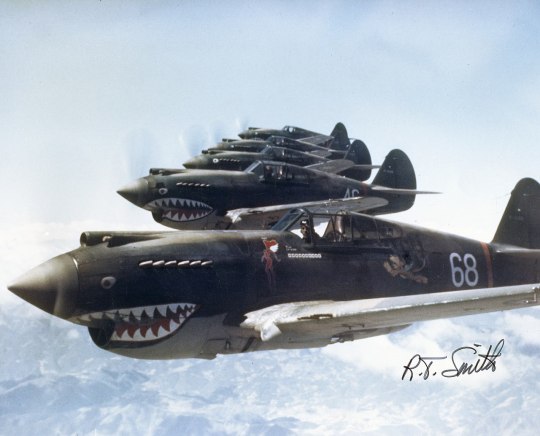
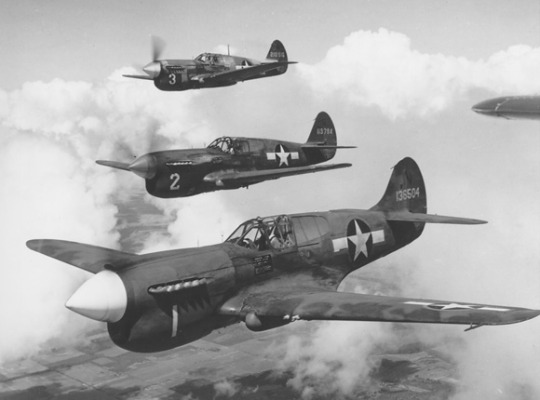

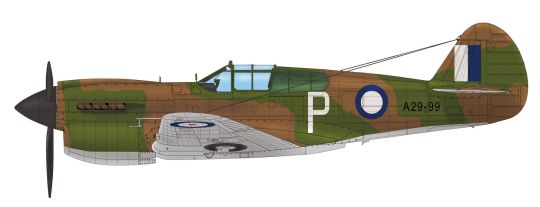

The Curtiss P-40 Warhawk is an American single-engined, single-seat, all-metal fighter and ground-attack aircraft that first flew in 1938. The P-40 design was a modification of the previous Curtiss P-36 Hawk which reduced development time and enabled a rapid entry into production and operational service. The Warhawk was used by most Allied powers during World War II, and remained in frontline service until the end of the war. It was the third most-produced American fighter of World War II, after the P-51 and P-47; by November 1944, when production of the P-40 ceased, 13,738 had been built,[3] all at Curtiss-Wright Corporation's main production facilities in Buffalo, New York.
P-40 Warhawk was the name the United States Army Air Corps gave the plane, and after June 1941, the USAAF adopted the name for all models, making it the official name in the U.S. for all P-40s. The British Commonwealth and Soviet air forces used the name Tomahawk for models equivalent to the original P-40, P-40B, and P-40C, and the name Kittyhawk for models equivalent to the P-40D and all later variants.
P-40s first saw combat with the British Commonwealth squadrons of the Desert Air Force in the Middle East and North African campaigns, during June 1941.[4][5] No. 112 Squadron Royal Air Force, was among the first to operate Tomahawks in North Africa and the unit was the first Allied military aviation unit to feature the "shark mouth" logo,[6][7] copying similar markings on some Luftwaffe Messerschmitt Bf 110 twin-engine fighters.[6] [N 1]
The P-40's lack of a two-speed supercharger made it inferior to Luftwaffe fighters such as the Messerschmitt Bf 109 or the Focke-Wulf Fw 190 in high-altitude combat and it was rarely used in operations in Northwest Europe. However, between 1941 and 1944, the P-40 played a critical role with Allied air forces in three major theaters: North Africa, the Southwest Pacific, and China. It also had a significant role in the Middle East, Southeast Asia, Eastern Europe, Alaska and Italy. The P-40's performance at high altitudes was not as important in those theaters, where it served as an air superiority fighter, bomber escort and fighter-bomber. Although it gained a postwar reputation as a mediocre design, suitable only for close air support, more recent research including scrutiny of the records of individual Allied squadrons indicates that this was not the case: the P-40 performed surprisingly well as an air superiority fighter, at times suffering severe losses, but also inflicting a very heavy toll on enemy aircraft.[9] Based on war-time victory claims, over 200 Allied fighter pilots – from the UK, Australia, New Zealand, Canada, South Africa, the US and the Soviet Union – became aces flying the P-40. These included at least 20 double aces,[10] mostly over North Africa, China, Burma and India, the South West Pacific and Eastern Europe. The P-40 offered the additional advantages of low cost and durability, which kept it in production as a ground-attack aircraft long after it was obsolescent as a fighter.
https://en.wikipedia.org/wiki/Curtiss_P-40_Warhawk
4 notes
·
View notes
Text

US P-66 Vanguard fighters at an airfield in Karachi, India, 25 Oct 1942.
173 notes
·
View notes
Text
Events 4.22
1500 – Portuguese navigator Pedro Álvares Cabral lands in Brazil (discovery of Brazil).
1519 – Spanish conquistador Hernán Cortés establishes a settlement at Veracruz, Mexico.
1529 – Treaty of Zaragoza divides the eastern hemisphere between Spain and Portugal along a line 297.5 leagues (1,250 kilometres (780 mi)) east of the Moluccas.
1809 – The second day of the Battle of Eckmühl: The Austrian army is defeated by the First French Empire army led by Napoleon and driven over the Danube in Regensburg.
1836 – Texas Revolution: A day after the Battle of San Jacinto, forces under Texas General Sam Houston identify Mexican General Antonio López de Santa Anna among the captives of the battle when some of his fellow soldiers mistakenly give away his identity.
1864 – The U.S. Congress passes the Coinage Act of 1864 that permitted the inscription In God We Trust be placed on all coins minted as United States currency.
1876 – The first National League baseball game is played at the Jefferson Street Grounds in Philadelphia.
1889 – At noon, thousands rush to claim land in the Land Rush of 1889. Within hours the cities of Oklahoma City and Guthrie are formed with populations of at least 10,000.
1898 – Spanish–American War: President William McKinley calls for 125,000 volunteers to join the National Guard and fight in Cuba, while Congress more than doubles regular Army forces to 65,000.
1906 – The 1906 Intercalated Games open in Athens.
1915 – World War I: The use of poison gas in World War I escalates when chlorine gas is released as a chemical weapon in the Second Battle of Ypres.
1930 – The United Kingdom, Japan and the United States sign the London Naval Treaty regulating submarine warfare and limiting shipbuilding.
1944 – The 1st Air Commando Group using Sikorsky R-4 helicopters stage the first use of helicopters in combat with combat search and rescue operations in the China Burma India Theater.
1944 – World War II: Operation Persecution is initiated: Allied forces land in the Hollandia (currently known as Jayapura) area of New Guinea.
1944 – World War II: In Greenland, the Allied Sledge Patrol attack the German Bassgeiger weather station.
1945 – World War II: Prisoners at the Jasenovac concentration camp revolt. Five hundred twenty are killed and around eighty escape.
1945 – World War II: Sachsenhausen concentration camp is liberated by soldiers of the Red Army and Polish First Army.
1948 – Arab–Israeli War: The port city of Haifa is captured by Jewish forces.
1951 – Korean War: The Chinese People's Volunteer Army begin assaulting positions defended by the Royal Australian Regiment and the Princess Patricia's Canadian Light Infantry at the Battle of Kapyong.
1954 – Red Scare: Witnesses begin testifying and live television coverage of the Army–McCarthy hearings begins.
1969 – British yachtsman Sir Robin Knox-Johnston wins the Sunday Times Golden Globe Race and completes the first solo non-stop circumnavigation of the world.
1969 – The formation of the Communist Party of India (Marxist-Leninist) is announced at a mass rally in Calcutta.
1970 – The first Earth Day is celebrated.
1974 – Pan Am Flight 812 crashes on approach to Ngurah Rai International Airport in Denpasar, Bali, Indonesia, killing all 107 people on board.
1977 – Optical fiber is first used to carry live telephone traffic.
1992 – A series of gas explosions rip through the streets in Guadalajara, Mexico, killing 206.
1993 – Eighteen-year-old Stephen Lawrence is murdered in a racially motivated attack while waiting for a bus in Well Hall, Eltham.
2005 – Japan's Prime Minister Junichiro Koizumi apologizes for Japan's war record.
2016 – The Paris Agreement is signed, an agreement to help fight global warming.
2020 – Four police officers are killed after being struck by a truck on the Eastern Freeway in Melbourne while speaking to a speeding driver, marking the largest loss of police lives in Victoria Police history.
0 notes
Text
Tiger Man

Summary: The year was 1941, bandmates and secret lovers Scotty Moore and Elvis Presley got caught red handed by Scotty’s fiancée, and this led to the young men being thrusted headlong into the China-Burma-India theater of World War II as members of the first American Volunteer Group (The Flying Tigers).
Chapter 8. Chamber of Darkness
Pairing: Scotty Moore/Elvis Presley (m/m), Ken Ishikawa/Elvis Presley (m/m)
Word Count: 2.9k
Warnings: prisoner of war, interrogation, electric torture, water cure
Major Ishikawa walked next to the patient bed and looked down at his strapped-down prisoner: “A Flying Tiger, huh? I heard you guys gave the Imperial ground troops and Air Force quite a bit of trouble despite your small overall numbers. We barely had any of you captured, so what you know could be very valuable information to us. You understand that cooperate with me would be the only chance you have of getting out of here alive, right?”
“Come on, we both know you’ll kill me as soon as I divulge the information.” The Young American sneered. “That you are wrong, Mr. Presley. Actually, I’d like to call you Elvis. Or even better, how about El?” Without any warning, Ishikawa reached down and caressed the side of the pilot’s face.
“No!!” Elvis shouted while pulling his head away as far as he could from the evil claw. “We are enemies! Don’t pretend to be otherwise or try to sweet talk me!” The Japanese major objected as he let go of the prisoner’s cheek, “we don’t have to be enemies, El. I’ve examined the calluses on your hands, I can tell you are a musician.” He took a hold of Elvis’ right hand which was tied to the siderail of the bed, and admired the long and slender fingers, the nicely proportioned flexible joints, the delicate vasculature just beneath the surface, the contrast between rough calluses on the fingertips and smooth skin elsewhere. This hand would be perfect for so many instruments, the major thought as he explained: “I played the violin all through school and seriously considered majoring in music at one point. So I know a thing or two about finger calluses. Oh, by the way, you can call me Ken.”
Thus far there was no sign that the captive had warmed up to the Japanese officer’s attempt at being friendly. In fact, Elvis kept his head turned to the side and was not looking at his interrogator at all. Ishikawa fought back the urge to grab the pilot’s jaw, twist it over and force the stubborn young man to look at him. “Listen, El. I know you are not a fan of war. You are just a hired hand, it does not make sense to get yourself killed over countries and conflicts you know nothing about. China was a great nation, but it had been ill for too long due to its weak and corrupt government. The Japanese empire is the new leader of Asia. We are trying to help the Chinese people overthrow the current inept and bureaucratic regime and defend them against colonial expansion of the Western powers. Leaders of the United States made the wrong call and sided with our enemy, that’s how we ended up in this mess right now.”
“So you see, the right and smart choice right now is to tell us all we need to know. This will help us end the war quickly so that American soldiers can all be sent back to their families and not have to lose their lives in the Orient anymore.” Ishikawa concluded with a look of self-assurance.
When Elvis finally turned his head back toward the Major, the stare of his blue eyes was so intense it felt like lasers on Ishikawa’s face. “Major, I am so impressed with your little speech I would have clapped if my hands were free. But you should save it for some other poor fellow who’s fallen into your hands. I’ve seen first-hand how you’ve treated the Chinese people you say you were trying to help! You shot them in the back just because they were men, blew someone’s brains out for not wanting to separate from their family, tried to violate a girl in public… Yes, I can see all the benefit the Japanese Empire has brought them! Some of my buddies died in combat, as far as I’m concerned, I myself have died twice already fighting you. So you can spare me all the talks since you ain’t gonna get nothin’ out of me. Just get on with what you wanna do!”
A surge of anger rushed to the interrogator’s head as he suddenly grabbed the patient by his hair, with a brutal force that threatened to pull some of it off: “You fool!!! You will regret this in time! Your life is in my hand, always remember that!!” He then let go of the victim, turned and walked out of the room, slamming the door behind him.
Elvis’ head fell back to the pillow, he waited in silence for the torture to come. He thought for a moment, this didn’t really feel as grandiose and heroic as what he had pictured in his idealistic mind. He felt more like helpless sheep waiting to be skinned and slaughtered by the butcher. Hours passed by and finally someone showed up, but it was not who the pilot was expecting. The stocky man with black-rimmed glasses introduced himself as Seto the physical therapist. He then proceeded to untie Elvis from all his restraints. This sounded great in theory, but in reality almost depressed the American even worse than before. He had no idea how stiff and feeble his muscles had become due to long periods of bedbound status. He could barely stand with the help of both Seto and a pair of crutches, and it wasn’t mainly because of his injured leg. It was almost dark comedy to realize that Elvis would be incapable of any serious attempts to escape even without the guards and straps. On the other hand, the purpose behind the Imperial Army’ effort to repair and rehab the wounded leg of a prisoner was not immediately clear to Elvis. By the end of the therapy session, the young man had gotten over the initial shock and was starting to get glimpses of hope for eventual recovery of his mobility again. Further respite came when he was left sitting in a chair next to the bed rather than being returned to the previous position. The rest of the afternoon and evening was similarly quiet and uneventful. Some meager hospital food was then provided which consisted of rice and very little protein. When it was time for lights-off, Elvis was tied back to the bed and surprisingly he entered sleep after a while even in this unnatural, immobilized posture.
As usual, Elvis’ slumber was punctuated by chaotic dream fragments dominated by Memphis, family and Scotty. This subconscious sanctuary was rudely shattered when some guards suddenly pulled him out of bed and threw him into a wheelchair. Without explanation they wheeled him out of his patient room for the first time. The interior of the military hospital was eerily quiet and sterile. All the patient doors were shut, but only a few had guards standing outside the room, suggesting there were occupants inside. The nurses’ station was spotless, populated by an all-male staff, many of whom in military uniforms. Elvis scarcely had time to take mental notes on the set up of the floor and look for possible exits, as he was promptly pushed into an elevator which then descended to what appeared to be the basement. After a few more minutes of being wheeled through dimly lit corridors, the guard pushed open a non-descript door and they had apparently arrived at their destination.
The young man from Memphis had never seen the inside of a torture chamber before except for the depiction in comic strips. But when he glanced around the cold and dark room, making out the outlines of a few scaffolds with ropes and chains hanging from them, and a metal shelf with whips and clubs slotted in it, he was quite certain this was exactly it. All four of the guards in the room were dressed in identical uniforms with white armbands that had large Japanese characters on them, just like the one Elvis had seen Major Ishikawa wear earlier. They dragged him to a short wooden counter and strapped him down horizontally by the neck and extremities. It did not fit too well, the lanky American ended up with his ankles and feet hanging over the edge. Someone then began the interrogation through a loudspeaker hidden somewhere in the small room, by his accent and intonation, Elvis could tell it was Ishikawa. The major introduced himself as a member of the Japanese military police (the Kempeitai), then announced that as the officer in charge of Elvis’ particular case, he would act as the police investigator, prosecutor, judge, jury and executioner as he saw fit. He urged the prisoner to consider the consequences carefully before refusing to answer his list of questions. During the ensuing pause, the guards rolled in a contraption which seemed almost innocuous. When they removed the wooden box that enclosed it, a large magneto was revealed with a hand crank attached. Well-trained in this type of operation, the Kempei soldiers readily fastened the pair of electrodes to the pilot’s ears.
Following this brief interruption, the officer in charge began to rattle off his list of questions which were very direct and centered around the organization, personnel, weaponry, training and tactics of the Flying Tigers unit as a whole. Without hesitation, Elvis responded with a firm refusal to answer any of them. “Just get on with it, I ain’t tellin’ you a thing!” the prisoner declared bravely. Major Ishikawa responded with an angry curse in Japanese and some type of command to the guards. Seconds later Elvis felt a thunderclap next to one ear, his mind went blank while his body went into spasmodic contractions. The electric current pierced through his whole being, and finally let up after an agonizing number of seconds. It took longer for the young man’s racing heart to slow down again, and for his mind to recover from the initial daze. The first thing he heard after that was a fit of cruel laughter from the hidden interrogator: “How do you like that for a wake-up call, Mr. Presley? Maybe it will jog your memory about some pertinent facts!” “You’re right, it reminded me that I’d spit on a bastard and coward like you!” Yelled the captured Tiger, clenching his teeth in defiance. This was soon met with predictable fury from his antagonist, whose order sent successive flashes of lightening through the victim’s flesh.
After a few rounds of shocks came up unfruitful, the Kempei officer decided to try to inflict more pain by changing the location of the electrodes. Subsequently the guards wrapped one lead over the young man’s finger and taped another one on his palate after the mouth was forced open with metal prong. The ensuing blast led to such a convulsion that Elvis would have bitten his tongue clean off if his mouth was not wedged open. His eyelids were spasmed shut and he could visualize what seemed like lightning bolts zig zagged in the darkness. He passed out briefly but was then revived with a foot stepping on his chest, while all of his muscles were feeling a peculiar combination of numbness and deep aches. “That’s right,” Memphis Flash refused to back down even then, “fry the last cell in my brain and you’ll end up empty-handed, you son of a bitch!”
Thus, the interrogation kept going through the night, becoming a contest of mental strength between two single-minded opponents. Finally, the session had to be terminated because the prisoner became physically too weak to verbalize anything. Directing his subordinates to transport the barely conscious airman back to his patient room, Ken Ishikawa felt conflicted inside. On the one hand, the officer was so frustrated and infuriated by the obstinacy and recalcitrance of the American he felt like kicking a hole in the wall; On the other hand, he was secretly relieved that he found an excuse to halt the proceedings for now, since he was starting to have real doubts if the other could survive too much longer of this.
Back on the patient floor, Elvis spent a good portion of the day in bed. Otherwise, his day went about as if nothing had happened overnight. The wound care and physical therapy both continued without interruption, although progress in the latter was hampered by the aftereffects of electric torture. That night the pilot was fortunately left alone, but only a day later the nightmare returned as he was dragged out of bed around midnight and wheeled down for round two in the interrogation room. The method employed this time was overall not significantly altered, there were only finite number of sensitive spots in a human body that could be utilized during this sadistic exercise. As the guards tried to get creative with the placement of the electrodes, Major Ishikawa suddenly changed the subject and direction of his questioning and began to probe into the American captive’s past and personal life. “Tell us, Mr. Presley, what is the significance of these two figures in your life, ‘Satinin’ and ‘Scotty’? What do they mean to you?” Elvis tensed up visibly when he heard the two people that meant the most to him being brought up by the enemy, “W-w-why should I tell you? A-and how did ya find out about them?” The Kempei officer replied with a chortle: “Wow, sounds like we’re onto something here. These two names were uttered a few times during your delirium when you arrived here in critical condition.” Elvis tried to shut down this intrusive line of inquiry right away: “Yes, they are near and dear to my heart, but you don’t deserve to know about them.”
“Mr. Presley. Or should I call you El?” The interrogator’s voice came through the wall speaker loud and clear. “I know you resent me right now because you are my prisoner, and we need to get all this top-secret information from you by any means necessary. However, stop and think, we are not that different, just happen to be fighting for opposing sides in this war. We all had a peaceful civilian life not that long ago. It is international politics and government propaganda that propelled simple folks like you and me into this conflict. We all have loved ones back home. I found your treasured necklace that you kept near your heart. The type of memento you carry betrays your sentimental nature. Think about how devastating it would be for your family and lover to learn about your suffering and ultimate death at enemy’s hands. How senseless would it be to end your life an ocean away from home, after being broken in mind, body and soul? Yet this wretched end can easily be averted if you’ll just give up your childish pride and misplaced trust and loyalty to your government.”
“Gotta hand it to you, Ishikawa.” The tied-down prisoner conceded after a moment. “I have no doubt a lot of Allied soldiers spilled their secrets under your persuasion. Too bad this ole boy ain’t gonna fall for your tricks! I’ve never been to college, but I sure as hell know the difference between right and wrong!! What’s more, I can see through you, wherever you’re hiding. You are a monster with blood of countless common folks and prisoners on your hands, so stop deluding yourself into thinking you still have a heart!!”
That last line of bitter accusation actually set off a seismic wave in the intelligence officer’s mind. “Am I just a cold-hearted murderer who liked to give myself excuses?” Ishikawa had to shake himself free from such self-doubt, he gave another ultimatum which was rejected with a resounding “Mama never raised me to be a traitor!!”. That was when the Major lost his cool, “looks like we’ve been too easy on you, boy…” was what squeezed out between his teeth with untold malice.
A swift change then occurred inside the interrogation chamber, the electrodes were withdrawn, and the magneto rolled aside, a big teapot was brought to the side of the torture table. Next someone pinched Elvis’ nose to force him to breathe through his mouth, then they inserted the metal prong again to keep it open. With this setup, the guards proceeded to pour gallons of cold water through the pilot’s mouth using the teapot in an assimilation of drowning. It was a terrible struggle as the young man coughed violently and tried in vain to thrash against the ropes which were tying him down. At long last, the torturers were satisfied with their work and let go of the victim’s nose. The ordeal left him in a woeful state, moaning and gurgling with residual water in his lungs and throat, his midsection in severe and painful distension. Unperturbed, the guards brought in a wooden plank and placed it across the suffering American’s swollen stomach, using it to play a cruel game of see-saw. Elvis was sure his internal organs all exploded as enormous pressure forced the water to burst out of all his orifices at once.
Moments later, Elvis was almost annoyed to find he was still alive as a guard slapped him awake. Ishikawa’s voice came over the speaker once again, sounding stern: “I’m sorry it had to come to this, El. But you really left me with no choice. You are young and headstrong, prone to rash decisions. I will end this session today and give you time to reconsider all your options. I hope you think long and hard before shooting off your mouth again. Let me know if you change your mind and want to cooperate with us before we have to go any further.”
#elvis presley#scotty moore#flying tigers#world war ii au#china-burma-india theater#elvis fan fic#m/m
3 notes
·
View notes
Photo

“United Nations May Seize French Possession,” Ottawa Journal. March 10, 1942. Page 12.
----
It is reported that the island of Madagascar, the fourth largest in the world, is to be occupied by armed forces of the United Nations.
#battle of madagascar#indian ocean theatre#world war II#french colonial empire#french imperialism#régime de vichy#vichy france#axis and allies#imperial japan#submarine base#china burma india theater#british empire
3 notes
·
View notes
Text
My boys, the Flying Tigers
A speech at a dinner in honor of the American Volunteer Group of the Chinese Air Force given by Generalissimo and Madame Chiang in Kunming on February 28, 1942, upon their return from India and Burma. The Generalissimo and Colonel Claire L. Chennault, Commanding Officer of the A.V.G., addressed the gathering before Mme. Chiang spoke.
Generalissimo Chiang's address.
Colonel Chennault, officers and men: To be with you American volunteers here today, to observe your excellent spirit and to hear of your achievements fills me with delight and admiration. The American Volunteer Group of the Chinese Air Force has acquired a world-wide reputation for greatest courage.
It is three months since the Japanese, our common enemy, picked their quarrel with Great Britain and the United States. The splendid victories the Volunteer Group has won in the air are a glory that belongs to China and our ally, America, alike.
I have already communicated the news of your repeated successes to your Government and President Roosevelt. The record of what you have done shows that everyone of you have been a match for thirty or more of the enemy. Your friends and relations will undoubtedly have felt boundless pride and elation to hear of your exploits. The blows you have struck at the Japanese have put you in the forefront of the Allied forces fighting the aggressor. You have established a firm foundation for the campaign against his lawlessness which China and American are united to wage. You have written in the history of this world war a remarkable page, the memory of which will live in our minds forever.
As the Supreme Commander of the Allied Forces operating in the China theater of war, I am entertaining you today as my comrades-in-arms and on behalf of my four hundred and fifty million fellow countrymen I salute you, confident that you will continue together with all the Allied forces in Burma to display your valor until final victory is won over our common enemy.
Since you are under my command, I wish to impress upon you your identity with all the other men serving in the Chinese armed forces. Your lives are one with their and mine, your good name is one with their and mine. I act toward you as I act toward other members of the Chinese Air Force. I shall extend to those of your comrades who have given their lives the same mark of distinction and the same care for their families and children. For this I hold myself responsible. I trust that you will perform your duties free from any anxiety on this score. Your task is great. When victory is ours I hope to celebrate together with you our successful issue of the war in Tokyo.
Colonel Chennault's response
Members of the A. V. G.: Never before in history do I know of any military unit such as ours having been accorded the honor such as comes to us tonight. No matter how many decorations we may have bestowed on us in the future I am sure we will never receive more honor than we have received tonight. For five years I have followed the Generalissimo to the best of my ability and I know him to be a leader of the highest principles and greatest determination. He is a leader, not only of China, but of the entire Allied effort. It is easy for us Americans to follow such a leader.
In addition to Madame Chiang's work in aviation, she is also the leader of all the women in China. The orphans and widows of China come to her either directly or through the agencies which she has setup and all receive aid. To me, she is the mother of China.
During this time millions of Chinese soldiers have gone to the fronts and have been killed and seriously wounded. Orphans have been left in the ruins of their homes and in the fields. All of these needed aid and they have been given that aid as rapidly as possible. And how there will be thousands more to feed and educate, to receive medical attention.
One problem, of course, is to provide the money for this. It takes money to do all these things, probably less in China than elsewhere
7
but even in China money is needed to buy these things. Madame Chiang's generosity is boundless. Her shoulders are always willing to take on additional burdens, but if money is lacking to provide the necessities her work must suffer. I would be unable to recite all that Madame Chiang has accomplished; however, one thing I have not yet mentioned. When the organization of this Group was first discussed in America I was asked for recommendations as to how it would be handled in China. The first thing that I insisted upon was that Madame Chiang should act as our chief staff officer; that Madame Chiang should serve as liaison staff officer between the Generalissimo and the Group. And although she has hundreds of activities that require a great deal of her time she consented to this because of her eagerness for China to have effective military aviation. So, even though you are unconscious of the fact, Madame Chiang has been Honorary Group Commander and Staff Officer of this Group since its organization and I would like to present her tonight as our Honorary Group Commander.
Madame Chiang's speech
Colonel Chennault, members of the A.V.G. and other friends: As your Honorary Commander may I call you my boys? You have flown across the Pacific in China's gravest hour on wings of hope and faith. For this reason not only does the Chinese Air Force but the entire Chinese nation welcome you with outstretched arms. The Generalissimo has already spoken to you of the fine and brave deeds you have done and he has called the A.V.G. the world's bravest air force.
I am very proud tonight that I have had a little share in making it possible for you to fight for China. When I think of the life-and-death struggle which China has passed through these last five years I have before my mind's eye the millions of our people who have been killed or wounded and others who had to flee from Japanese cannon, machine guns and bombers. I also see the rivers of blood which have flowed over our territory, the very lifeblood of China's fairest manhood. I think of the tens of thousands of our women whose honor has been violated by the Japanese and the hundreds of thousands of our little children who have been killed and maimed or else taken to Japan to be trained as traitors to their motherland.
8
And now you have come here to vindicate us. We have always been resolved to fight until final victory is ours but we lack the air arm which you are now providing. You have come to fight side by side with us. For this I wish to express our heartfelt thanks.
Colonel Chennault has taken an active part in Chinese resistance during the last five years. You boys know him personally. You know what an admirable commander he is and how very selfless. The only complaint I have against him is that he is never satisfied with his own work. I venture to say, too, that he also thinks that you ought to have more work regardless of how much you already have.
Colonel Chennault has just introduced me as Honorary Commander of the A.V.G. I think I am prouder of this title than any other title I've had because I know that you are not only fighting with your bodies and your skill, you are fighting with your hearts and spirits. Just now Colonel Chennault brought to me two of your very fine comrades who have braved death today in the air. They forgot themselves entirely while fighting the enemy because they knew that although they might have to make the final sacrifice their comrades would carry on the great work which the A.V.G. has set for itself. This Spirit, I feel, is the secret of the A.V.G.'s successes.
I was asked a little while ago by one of my officers, "Madame Chiang, some of the A.V.G. pilots are shooting down so many planes that we won't have room enough on the wings for all the stars which they merit. What shall we do about it?" I told him, "We shall have to provide them with an additional pair of wings." And that is what we will have to do if you all keep up the score.
Although you are here in China I am sure that often your minds and your hearts fly back to your loved ones in America, and for this reason I am glad that American is now realizing that China is not fighting for China alone but for American and for the whole world. You, in giving the best that is in you, are doing it for your own country as well as for China. Time and again your Commanding Officer has dinned into your ears the necessity for discipline. Hateful word, isn't it? Discipline in the air, discipline on the field, and yet without discipline we can accomplish nothing and I, as your Honorary Commanding Officer, am going to din more discipline into you.
9
I would go further than Colonel Chennault. I mean discipline of your inner selves. It isn't enough to observe discipline only. We must have inner discipline so that we may have fully-developed characters. However, I am not trying to make you little plaster saints and I am quite human enough to like interesting people, but I do want you boys to remember one thing: the whole of the Chinese nation has taken you to its heart and I want you to conduct yourselves in a manner worthy of the great traditions that you have built up. I want you to leave an impression on my people, and true impress of what Americans really are. I trust and I know that you will act worthily wherever you are in China.
Forgive me for speaking to you like that. Perhaps I should be very polite and say, "Boys, you are just grand. You are little angels with or without wings." But you are my boys. I can speak to your freely. I know that you will understand when I say that I hope every one of you, whether in the air or on the ground, will remember that you are China's guests and that everything you do will reflect credit upon the country which I love next to my own, America, where as you know I was educated and which I always look upon as my second home.
Colonel Chennault just now said something which rather embarrassed me. He spoke to you about my needing money to carry on relief work. I know that money is necessary, Colonel, but I don't want to rope you boys in tonight for this purpose. If I had, this dinner would be very hard to digest, so I didn't do that: but I do want to thank you for what you voluntarily contributed to the war orphans during Christmas. Please don't feel that you have to contribute now, that's one thing I beg of you.
Just one final word. War is not only a matter of equipment, artillery, ground troops or air force; it is largely a matter of spirit, or morale. When I came into this room I felt at once how very keyed-up you are. Now that you have been fighting for a few months, you are full of enthusiasm and pep. That is a good thing. But the greater thing is to gather momentum as each day goes by and not let yourself be discouraged no matter what happens, because as you soar into the skies you are writing letters of flame on the horizon certain eternal truths for the world to see: First, the indomitable courage of the Chinese people; second, the indestructible spirit of the Chinese Army; and third, the deathless soul of the Chinese nation. And so, whatever you
10
do, wherever you are, remember that such is the China which you have come to assist.
I would like all of you to get up and drink a toast to the two great sister nations facing each other across the Pacific. They now have a bond of friendship and sympathy which serves us well in the crucible of war and which will serve us equally when victory has been won.
11
(fourth installment)(sixth installment)
#we chinese women#mme. chiang kai-shek#speeches and writings during the first united nations year#fifth installment
0 notes
Text
Acts 18:9,10
“One night the Lord spoke to Paul in a vision and told him, `Don’t be afraid! Speak out! Don’t quit! For I am with you and no one can harm you….ʼ”
~Acts 18:9, 10
“During World War II my dad was a fighter pilot in the South Pacific. His older brother, my uncle Francis, flew over the Himalayas in the China-Burma-India theater. Both of them flew hundreds of miles over uncharted terrain that…

View On WordPress
0 notes

